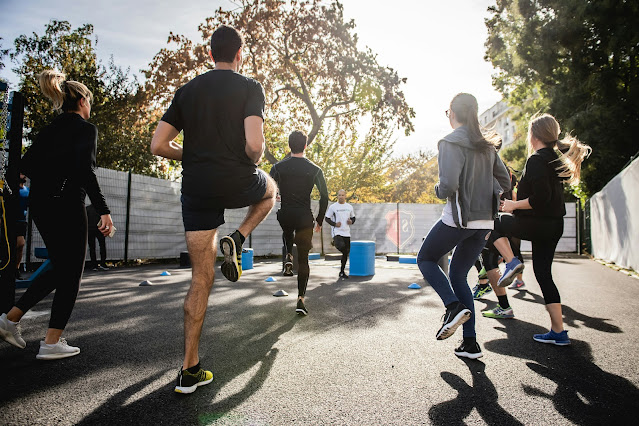Introduction to Pre-Workout Techniques
Pre-workout techniques are a set of practices by individuals
before going in physical exercise or a workout session. These techniques are
designed to prepare the body and mind for the upcoming physical works and
reduce the risk of injury. The significance of pre-workout techniques lies in
their ability to optimize various aspects of an individual's preparation for
exercise, contributing to a more effective and efficient workout experience.
Here are key reasons why warming up is important:
- Warming up gradually increases the heart rate and blood flow to the muscles. This helps deliver oxygen and nutrients to the tissues, ensuring they have the energy required for more intense physical activity.
- Warming up includes dynamic stretching and mobility exercises, which enhance muscle elasticity and joint flexibility. This reduces the risk of muscle related injuries during exercise.
- Warming up activates the nervous system, improving neuromuscular coordination and responsiveness. This is crucial for efficient movement and can enhance overall performance.
- Warming up helps initiate physiological processes that help in post-exercise recovery. It remove of metabolic byproducts, such as lactic acid, reducing muscle soreness and promoting a faster recovery.
- Warming up provides a mental transition from rest to activity. It allows individuals to focus their attention on the upcoming workout, enhances concentration, and reduces anxiety or stress associated with exercise.
1. Dynamic Warm-Up Exercises:
Dynamic warm-up exercises are crucial in preparing the body for intense physical activity by actively engaging the muscles and increasing the heart rate gradually dynamic warm-ups involve continuous movement patterns that mimic the activities to be performed during the workout.
examples of dynamic warm-up exercises targeting different muscle groups:
Leg Swings:
Target Muscles: Hamstrings and quadricepsExecution: Stand next to a sturdy surface, like a wall or a pole, and swing one leg forward and backward in a controlled manner. Repeat for the wished number of repetitions and then switch legs. Know more.
Arm Circles:
Target Muscles: Shoulders and upper backExecution: Extend your arms to the sides and make small circles in a clockwise and
High Knees:
Target Muscles: Hip flexors and quadricepsExecution: While standing, lift your knees as high as possible, alternating between legs in a marching motion. Engage your core for stability. Know more.
Butt Kicks:
Target Muscles: HamstringsExecution: While jogging in place, kick your heels up toward your glutes. Focus on a smooth and controlled motion. Know more.
Jumping Jacks:
Target Muscles: Full body, especially shoulders, legs, and cardiovascular systemExecution: Start with feet together and arms at your sides. Jump, spreading your legs and raising your arms overhead. Return to the same position and repeat. Know more.
Hip Circles:
Target Muscles: Hips and lower back
Execution: Stand with hands on your hips and rotate your hips in a circular motion, both clockwise and counterclockwise. Know more.
2. Proper Nutrition and Hydration
A balanced diet and adequate fluid intake can optimizing performance, ensuring energy availability, and promoting overall well-being during physical activity.
Here are some key reasons why proper nutrition and hydration
are important:
- Balanced meals containing a combination of carbohydrates, proteins, and fats provide a steady release of energy during exercise. Carbohydrates are particularly important as they are the body's primary source of fuel.
- Consuming healthy meals helps regulate blood sugar levels. Maintaining stable blood sugar is crucial for avoiding energy crashes and sustaining performance throughout the workout.
- protein intake before exercise helps prevent muscle breakdown. This is especially important during intense training or other activities that place stress on the muscles.
- Proper fluid intake before exercise ensures that the body is well-hydrated, supporting temperature control. Dehydration can decreased performance and an increased risk of heat-related illnesses.
- Sweating during exercise can lead to the loss of electrolytes such as sodium, potassium, and magnesium. Consuming balanced meals with electrolyte-rich foods or beverages helps maintain proper electrolyte balance.
Pre-workout nutrition plays a crucial role in providing the
energy and nutrients needed to fuel your workout and optimize performance. Here
are some tips for pre-workout nutrition, including suggestions for meals and
the selection of nutrient-rich foods and beverages:
Timing:
Take a balanced meal 2-3 hours before your workout.
Have a small snack 30-60 minutes before if you're short on
time.
Balanced Macronutrients:
for sustained energy you can take a mix of carbohydrates,
proteins, and healthy fats.
Carbohydrates are essential for quick energy, while proteins helps in muscle repair and maintenance.
Carbohydrates:
Choose complex carbohydrates before pre-workout such as
whole grains, fruits, and vegetables.
Examples: Oatmeal, whole-grain toast, brown rice, quinoa,
and fruits like bananas or berries.
Hydration:
Consume a small amount of water 1-2 hours before your
workout.
Avoid excessive amounts to prevent discomfort during
exercise.
Healthy Fats:
Incorporate sources of healthy fats for sustained energy.
Examples: Avocado, nuts, seeds, and olive oil.
3. Breathing Techniques and Mindfulness Practices
Proper breathing techniques before exercise are crucial for
preparing the body, both physiologically and mentally, for the upcoming
physical activity. The pre-exercise phase sets the foundation for efficient
oxygen intake, enhances mental focus, and helps manage stress.
Here are key reasons of proper breathing techniques before
exercise:
- Intentional and deep breathing helps oxygenate the body and primes the cardiovascular system for increased demands during physical activity. This ensures that the muscles have sufficient oxygen for optimal performance.
- Deep and intentional pre-exercise breathing can activate the nervous system, promoting relaxation and reducing stress levels. This mental preparation is valuable, particularly before challenging or high-intensity workouts.
- Proper breathing techniques help clear the mind, improve concentration, and enhance mental focus. This mental preparedness is crucial for maintaining attention to form, technique, and goals during exercise.
Here are some breathing exercise:
Deep Belly Breathing:
- Inhale deeply through your nose and allowing your diaphragm to expand and your abdomen to rise.
- Exhale slowly by your mouth, feeling your abdomen fall.
- Focus on making each breath slow, controlled, and from the diaphragm rather than shallow chest breathing.
Rhythmic Breathing:
- Match your breathing rhythm to your exercise movements.
- For example, during a run, inhale for two steps, exhale for two steps.
- Adjust the rhythm based on the intensity of your exercise.
Pursed Lip Breathing:
- Inhale by your nose for two counts.
- Exhale by pursed lips for four counts.
- This technique helps improve lung function and can be beneficial during cardiovascular exercises.
Is pre-workout good for health?
Pre-workout supplements can provide benefits such as
increased energy and focus, but they can also have risks, especially with high
caffeine content. It is extremely important to read labels, consider personal
sensitivities, and consult a healthcare professional when necessary. Prioritize
a balanced diet and hydration for optimal performance.
Can we take pre-workout daily?
While it's possible to take pre-workout supplements daily,
it's advisable to do so cautiously, considering factors like caffeine
tolerance, potential dependency, and individual health. Regular use without
breaks may lead to tolerance and reduce effectiveness. Consulting with a
healthcare professional is recommended, and some individuals choose to cycle
their use of pre-workout supplements to prevent tolerance.
how long does pre workout last?
The effects of pre-workout supplements typically last for
about 2 to 4 hours, depending on individual sensitivity and the specific
ingredients in the supplement.
Additional Resources and References


.png)





.png)


